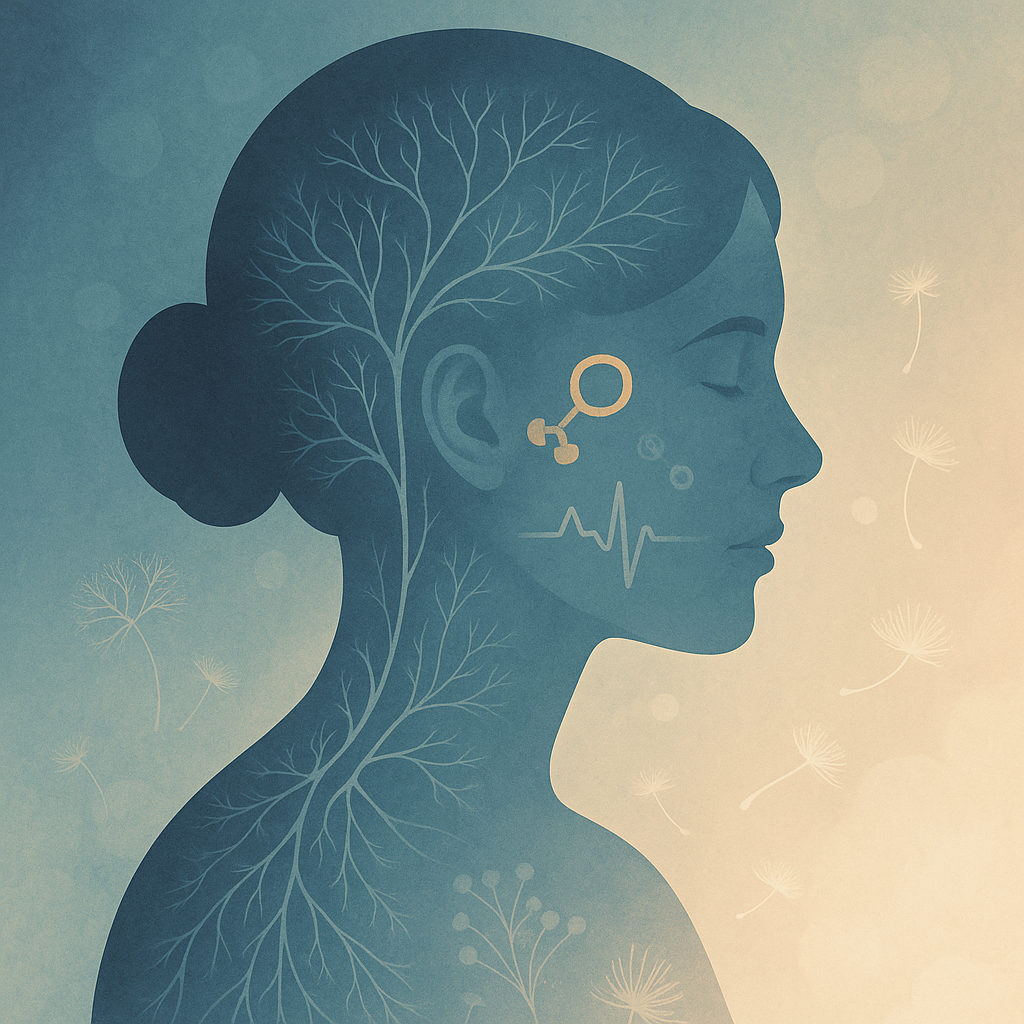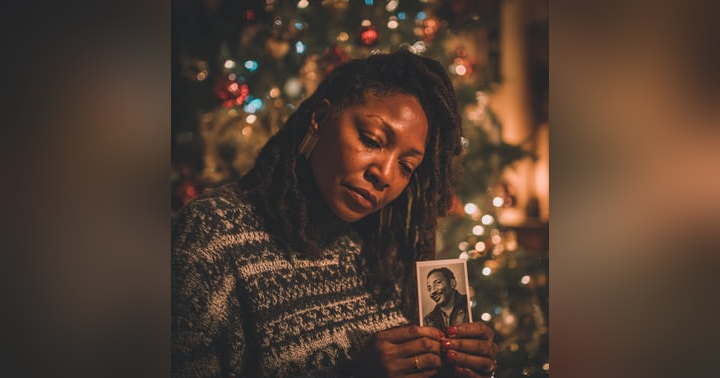When Loss Rewrites Your Biology: The Hidden Health Crisis Every Grieving Woman Faces

When Loss Rewrites Your Biology: The Hidden Health Crisis Every Grieving Woman Faces
Why your body feels like a stranger after loss—and what science reveals about grief's assault on women's health
The crushing fatigue hits without warning. Your emotions swing like a pendulum between numbness and overwhelming intensity. Sleep becomes elusive, your cycles erratic, and simple tasks feel impossible. If you're grieving and your body feels like it's betraying you, you're not imagining it—and you're certainly not alone.
In a powerful conversation on Heartprints of Loss, widow warriors Amanda, Sophy, and Kristin sat down with Dr. LaRessa Ferdinand, a board-certified OB-GYN and integrative health specialist, to uncover a truth that's rarely discussed: grief doesn't just break your heart—it literally rewrites your biology.
The Science Behind Your Suffering
"Your brain is one of the most sexiest organs to me," Dr. Ferdinand explains, "and it has so many unknowns. But a lot of your hormone signals are starting from that. Your stress responses are starting from that."
When loss strikes, your nervous system shifts into survival mode. The sympathetic nervous system—responsible for fight-or-flight responses—becomes hyperactive, while the parasympathetic system that governs rest and recovery takes a backseat. This isn't a temporary adjustment; it's a biological rewiring that impacts every aspect of your health.
Your Body Under Siege
Dr. Ferdinand breaks down what happens when grief meets an already taxed nervous system:
"So mix that in with grief, where we're already having some dysregulation of our nervous system. And then now we're going to impact it with emotional... this may manifest in different physical symptoms. So for us, it's maybe poor sleep. I got an attitude..."
The results are devastating and wide-ranging:
- Severe fatigue that rest can't cure
- Emotional volatility that feels completely foreign
- Sleep disruption and persistent brain fog
- Hormonal chaos affecting everything from cycles to mood
- Physical pain that doctors struggle to explain
The Menopause Connection No One Talks About
Here's a statistic that should stop you in your tracks: 80% of women will experience significant grief or loss during their hormonal transition years. With the average age of widowhood being 59 and perimenopause symptoms starting as early as 45, the collision of grief and hormonal changes creates a perfect storm.
"Average age of menopause," Dr. Ferdinand notes, "is when a woman has a uterus still intact for a year [without cycles]. However, many women are going to start experiencing those symptoms way before that happens."
When Grief Accelerates Biological Changes
Grief doesn't pause for your body's natural timeline. Those stress hormones coursing through your system can accelerate perimenopause symptoms, intensify existing hormonal fluctuations, and create new health challenges you never saw coming.
As podcast co-host Kristin shared her experience: "I started realizing a lot of stuff that I was not even noticing. When I had a husband and a teenager, it was so different. I didn't pay that much attention to my body... but when that happened and I moved to Charlotte, I was like, I just noticed every time I came on my cycle... my grief would hit me harder around that time."
The Dismissal Crisis
Perhaps most damaging is how frequently women's grief-related health concerns are dismissed. Dr. Ferdinand's mission extends beyond treatment to advocacy: "I don't want it to be... 'oh, you'll just get over it, or this is normal, suck it up,' and get dismissed, because that's the last thing we want."
This dismissal is particularly acute for women of color. "Black women especially are dismissed a lot when it comes to pain. And there's research to even show that," Dr. Ferdinand emphasizes.
The Power of Self-Advocacy
The solution begins with believing yourself and refusing to accept dismissive treatment. As Amanda shared her experience with a brain aneurysm that was initially dismissed as "just a headache": "Be persistent in knowing how you feel, what may have been normal, what you knew is normal for your body. And if you're not feeling that, do what is best for you and your body."
Building Your Health Recovery Team
Dr. Ferdinand introduces a powerful concept: assembling your "board of directors of health" where you serve as CEO. This team might include:
- A grief-informed primary care physician
- A women's health specialist who understands hormonal changes
- A trauma-informed therapist
- Trusted friends and family who support your healing journey
- Healthcare providers who listen and validate your experiences
"You can't serve from an empty cup," Dr. Ferdinand reminds us. "You have to take that time."
The Path Forward: From Surviving to Thriving
The journey from grief-induced health chaos to healing isn't linear, but it is possible. Dr. Ferdinand's approach focuses on:
- Recognition and Validation
Understanding that your physical symptoms are real, valid, and directly connected to your grief experience.
- Holistic Assessment
Looking at the whole person—not just isolated symptoms—to understand how grief has impacted your entire system.
- Intentional Healing
Creating space for recovery while maintaining urgency about addressing serious health concerns.
- Community Support
Building networks of understanding that extend beyond just medical care to include emotional and practical support.
The Urgency of Now
Dr. Ferdinand's parting message carries weight: "Take the time that you need, but have some kind of state of urgency when things are not right with your mental and physical well-being. Don't get complacent about it."
In a healthcare landscape where women's concerns are routinely minimized, this urgency becomes even more critical. Your body's distress signals aren't weakness—they're information. They're your biology telling you that extraordinary circumstances require extraordinary care.
Breaking the Silence
The conversation between Amanda, Sophy, Kristin, and Dr. Ferdinand represents something revolutionary: honest dialogue about how grief ravages women's bodies. These aren't comfortable topics, but they're necessary ones.
As Dr. Ferdinand noted about her evolution as a physician: "Women sharing their experiences and what's going on with their bodies and stuff helped me evolve as a physician in my dialogue, how I reach out, and having honest conversations, even sharing about my own vulnerabilities."
Your Body Remembers—But It Can Also Heal
Grief may have rewritten your biology, but that doesn't mean the story ends there. With proper support, advocacy, and understanding of what's happening in your body, healing becomes possible.
Your grief is valid. Your physical symptoms are real. Your need for comprehensive care is urgent. And most importantly, you deserve healthcare providers who see you, hear you, and believe you.
The path back to feeling at home in your body after loss isn't easy, but it's possible. It starts with understanding that when loss rewrites your biology, rewriting it again—toward healing—becomes not just an option, but a necessity.
Looking for support on your grief journey? Connect with the Heartprints of Loss community and find Dr. LaRessa Ferdinand at @DrLareesa on Instagram for ongoing health advocacy and education.
#GriefAndHealth #WidowSupport #WomensHealthAdvocacy #HormonalHealth #GriefRecovery #MenopauseAndGrief #HealthAfterLoss #PhysicalGrief








